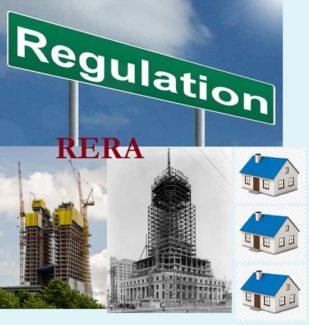
India, May 2, 2017/Team Estrade//– Real Estate (Regulation and Development) Act 2016, came into force on May 1, 2017. Under this law, it is mandatory for all states to set up a state level Regulatory Authority, that will regulate and oversee the functioning of the Real Estate industry. This is a positive step in the regulation of buying and selling of properties, thereby protecting both the buyers and the developers.
Team Estrade spoke to the following developers for their reactions on the coming into force of RERA,

Rahul Nahar, Founder, Xrbia Developers Ltd
Addressing India’s affordable housing shortage requires continuous collaboration between the public and private sector, and developments this year have been promising. Firstly, after a long wait, the government finally awarded infrastructure status to the long-neglected sector of affordable housing. By ensuring easier access to institutional credit, this decision has helped to reduce developers’ cost of borrowing for affordable projects, savings that in turn have been passed on to homeowners.
In addition to this supply-side incentive, the government’s PMAY scheme, which provides a credit linked subsidy to home buyers purchasing residences below 60sqm, has significantly reduced the costs of buying a house and expanded the possibility of home-ownership to a greater number of families. With demand for affordable housing now set to increase by a further 25% in the coming years, PMAY has decisively contributed to the growth of this market segment.
“increased transparency and accountability that will result from this act promises to benefit housing developers, as well as home buyers.”
The government’s latest intervention into the affordable housing market has, however, been met with mixed feelings. On 1st May, 2017, the Real Estate Regulation and Development Act 2016 (RERA) will become effective across the country. While some have criticised these new rules as “arbitrary” and “draconian”, others have welcomed these tighter regulations as a way to introduce greater accountability into the industry.
What do the new regulations address? While the Act consists of a range of measures to increase transparency in the real estate sector, a few key issues stand out. First, the Act obliges the developer to keep 70% of project funds in a dedicated bank account to ensure that developers are not able to invest in numerous new projects with the proceeds of the booking money from the first project, thus delaying completion and handover to consumers. Concurrently, if the project is delayed, the developer is liable to pay the consumer interest at the same rate as that which the consumer is paying the bank. Finally, the law makes it obligatory for developers to provide all information on issues such as project plan, layout, government approvals, land title status and schedule for completion to the State Real Estate Regulatory Authority (RERA), which can then be accessed by consumers.
The increased transparency and accountability that will result from this act promises to benefit housing developers, as well as home buyers. Above all, the act could go a long way in restoring the broken relationship between developers and consumers. For a long time, the majority of developers that have been fair to their consumers have been brought down by the actions of a minority, to the extent that the sector has now become synonymous with delays, overpricing and shortchanging. If the act restores consumer trust, the sector could see greater demand flood in as homebuyers invest with greater confidence.
Furthermore, by boosting the industry’s credibility, the act could attract more sources of investment into the affordable housing sector and further reduce the cost of financing. Indeed, foreign direct investment could surge as a result of this increased transparency as the 1st May will undoubtedly see the real estate sector given the go ahead by investment analysts.
The industry has a lot of reasons to look forward to the implementation of RERA. For the majority of affordable housing developers that have always served the interest of their consumers, these regulations merely promise to level out the playing field.

Rakesh Reddy, Director- Aparna Constructions & Estates Pvt. Ltd
“With the implementation of the Real Estate and Regulation Act on May 1 and the setting up of the Real Estate Appellate Tribunals, this will only further our resolve to continue to serve our customers better. We are yet to see the Telangana Government coming up with the rules and setting up of institutional mechanism for implementation and operationalization of RERA.
RERA will be a game changer for the market and its players and will bring in much needed transparency in the industry. This act will level the field between the developer and the customer. Since all the projects from a developer must be registered with RERA and all details with regards to the project such as actual carpet area, information, sanctioned plans, stage wise time schedule of completion of the process, provisions for civic infrastructure like water, sanitation and electricity, five year track record of the developer, approval by authorities etc. will have to be put up on the RERA portal by the developer.
“Implementation of RERA coupled with GST (which could bring down the average cost of some raw materials by about 3 per cent) will have a huge benefit for the customers.”
Also a developer can only collect 10% of the cost of the unit until the developer has all approvals in place and enters into and registers the sales agreement with the customer. This will increase the confidence of the buyers, bring them back into the market and help shift the market share towards the organised players. The developers will have to strictly follow the sanctioned plans and any deviation will incur a fine of 5% of the estimated project cost and imprisonment.
Implementation of RERA coupled with GST (which could bring down the average cost of some raw materials by about 3 per cent) will have a huge benefit for the customers. One of the areas where we see RERA is lacking is when government agencies which have a say in the project approval and completion are left out of its ambit. This becomes all the more crucial in instances where a project is delayed due to delay in issuance of completion certificate and when there is no provision to fix the issue and get the problem solved. In such instances the developer could be held responsible whereas in reality it is beyond his control to fix the problem.”
RERA comes into force: Developer’s view






